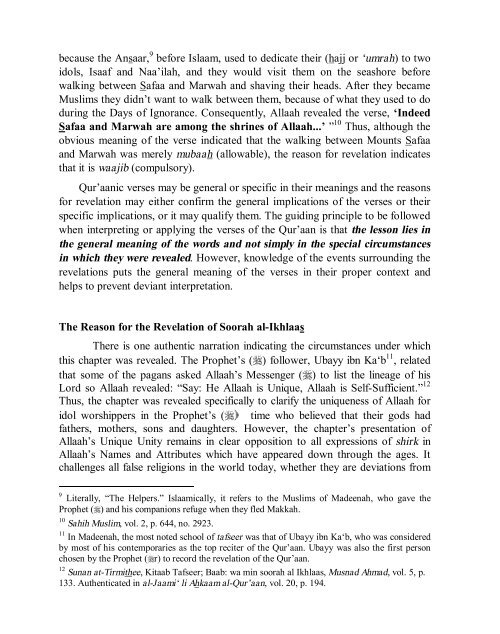Create successful ePaper yourself
Turn your PDF publications into a flip-book with our unique Google optimized e-Paper software.
ecause the Ansaar, 9 before Islaam, used to dedicate their (hajj or ‘umrah) to two<br />
idols, Isaaf and Naa’ilah, and they would visit them on the seashore before<br />
walking between Safaa and Marwah and shaving their heads. After they became<br />
Muslims they didn’t want to walk between them, because of what they used to do<br />
during the Days of Ignorance. Consequently, Allaah revealed the verse, ‘Indeed<br />
Safaa and Marwah are among the shrines of Allaah...’ ” 10 Thus, although the<br />
obvious meaning of the verse indicated that the walking between Mounts Safaa<br />
and Marwah was merely mubaah (allowable), the reason for revelation indicates<br />
that it is waajib (compulsory).<br />
Qur’aanic verses may be general or specific in their meanings and the reasons<br />
for revelation may either confirm the general implications of the verses or their<br />
specific implications, or it may qualify them. The guiding principle to be followed<br />
when interpreting or applying the verses of the Qur’aan is that the lesson lies in<br />
the general meaning of the words and not simply in the special circumstances<br />
in which they were revealed. However, knowledge of the events surrounding the<br />
revelations puts the general meaning of the verses in their proper context and<br />
helps to prevent deviant interpretation.<br />
The Reason for the Revelation of Soorah al-Ikhlaas<br />
There is one authentic narration indicating the circumstances under which<br />
this chapter was revealed. The Prophet’s (r) follower, Ubayy ibn Ka‘b 11 , related<br />
that some of the pagans asked Allaah’s Messenger (r) to list the lineage of his<br />
Lord so Allaah revealed: “Say: He Allaah is Unique, Allaah is Self-Sufficient.” 12<br />
Thus, the chapter was revealed specifically to clarify the uniqueness of Allaah for<br />
idol worshippers in the Prophet’s (r) time who believed that their gods had<br />
fathers, mothers, sons and daughters. However, the chapter’s presentation of<br />
Allaah’s Unique Unity remains in clear opposition to all expressions of shirk in<br />
Allaah’s Names and Attributes which have appeared down through the ages. It<br />
challenges all false religions in the world today, whether they are deviations from<br />
9 Literally, “The Helpers.” Islaamically, it refers to the Muslims of Madeenah, who gave the<br />
Prophet (r) and his companions refuge when they fled Makkah.<br />
10 Sahih Muslim, vol. 2, p. 644, no. 2923.<br />
11 In Madeenah, the most noted school of tafseer was that of Ubayy ibn Ka‘b, who was considered<br />
<strong>by</strong> most of his contemporaries as the top reciter of the Qur’aan. Ubayy was also the first person<br />
chosen <strong>by</strong> the Prophet (rr) to record the revelation of the Qur’aan.<br />
12 Sunan at-Tirmithee, Kitaab <strong>Tafseer</strong>; Baab: wa min soorah al Ikhlaas, Musnad Ahmad, vol. 5, p.<br />
133. Authenticated in al-Jaami‘ li Ahkaam al-Qur’aan, vol. 20, p. 194.














